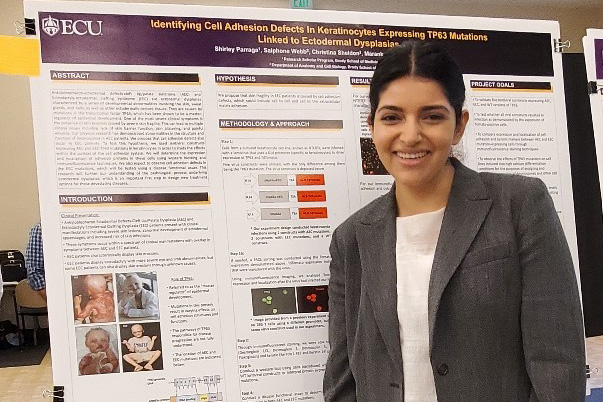A Journey of Dedication & Discovery
Meet Shirley Parraga of the Wake Forest School of Medicine, Department of Dermatology and research assistant to Dr. Maranke Koster. Shirley’s journey with the National Foundation for Ectodermal Dysplasias (NFED) exemplifies a deep commitment to advancing research and providing hope for families affected by rare skin diseases.
“Why I Give My Time to the NFED”

“The NFED is unlike any other organization I’ve been a part of. It connects hundreds of families affected by rare skin diseases in an effort to promote further awareness and research. Everyone knows each other as part of the ‘NFED family’, not just as a subject or patient. After having conducted previous dermatologic research efforts, I can confirm this is not always the case.”
Shirley’s heartfelt connection to the NFED stems from the organization’s unique approach to fostering a sense of community among its members. This supportive environment has fueled her dedication to contributing her time and expertise to this important cause.
The Importance of Volunteers
“Patients with rare skin conditions may feel ostracized. It’s important for them to know there’s someone out there that understands their needs. Furthermore, for them and their families, it helps to know that a dedicated team is working to develop new treatment options and developments for their skin conditions.”
Shirley emphasizes the crucial role volunteers play in the NFED community. By providing understanding and support, volunteers help patients and their families feel less isolated and more hopeful about the future.
“A Transformative Experience”
Shirley recalls a particularly powerful moment from the 2021 NFED International Ectodermal Dysplasias Research Conference in Charlotte, NC.

“This was the first time I was exposed to a large-scale scientific community. Witnessing presenters from all over the world share recent discoveries on their respective research focuses was tremendously inspiring. It was during this conference that I distinctly remember sharing with my Principal Investigator (Maranke Koster, Ph.D.) that I was deeply motivated in pursuing a career in dermatology.”
The conference was a turning point for Shirley, solidifying her passion for dermatology and inspiring her to pursue a career dedicated to helping children with rare skin conditions.
While currently applying for a dermatology residency, Shirley’s ultimate goal is to become a pediatric dermatologist.
Ongoing Support & Future Goals
“I hope to contribute to the efforts of the NFED throughout the rest of my career. Whether this includes collaborating on basic science research, assisting in clinical procedures or simply helping to raise awareness. However, I can help—I’m here!”
Shirley’s commitment to the NFED is unwavering. She plans to continue supporting the organization through various means, ensuring that her efforts will benefit patients and their families for years to come.
Research Contributions

Shirley’s research projects for the NFED are significant. One such project focuses on identifying cell adhesion defects in keratinocytes expressing TP63 mutations linked to ectodermal dysplasias.
“Through immunofluorescent staining, we were able to track desmosomal and keratin proteins in different cell lines displaying AEC and EEC mutations. Our results indicated that skin fragility in EEC patients is caused by cell adhesion defects.”
Another project involves the Wound Imaging Task Force, aiming to analyze the progression of AEC and EEC wounds over time using specialized imaging software. These research efforts are crucial in understanding and addressing the complexities of these rare skin conditions.
The Impact of Volunteering
Shirley’s journey with the NFED began in 2021 through the Medical Student Research Program (MSRP) at the Brody School of Medicine. Since then, she has taken on various roles, from assisting in basic sciences tasks to becoming a Student Writer and a member of two focused wound healing task forces. Reflecting on her experience, Shirley shares:
“When I first saw my first patient affected by a rare skin disorder (epidermolysis bullosa, dystrophic type) in the clinic, I came to realize how much dermatologic care affected not just patients’ but also their caregivers’ quality of life. This highlighted the importance of offering empathetic care suitable to meet the needs of each patient.”
Looking Forward
Shirley eagerly anticipates the monthly Zoom calls with her colleagues from the wound healing task forces and the annual NFED Family Conference or walks/5Ks. These events offer opportunities to reconnect with friends and fellow NFED members, making them cherished moments in her volunteer journey.
Her Message to Future Volunteers
Shirley wholeheartedly recommends volunteering for the NFED.
“The NFED has so many potential avenues for volunteering. It’s such a fulfilling endeavor to collaborate on their main goal, which is to find optimal treatment options, and one day possibly a cure, for patients burdened by rare skin disorders.”
Closing Thought
Through her dedication and passion, Shirley Parraga continues to make a profound impact on the NFED community. Her journey serves as an inspiration to others, highlighting the importance of empathy, research and volunteerism in making a difference in the lives of those affected by rare skin conditions.
A quote Shirly lives by: “I’ve failed over and over again in my life. That is why I succeed.” – Michael

Excelente aportación a la señorita dra Shirley Parraga